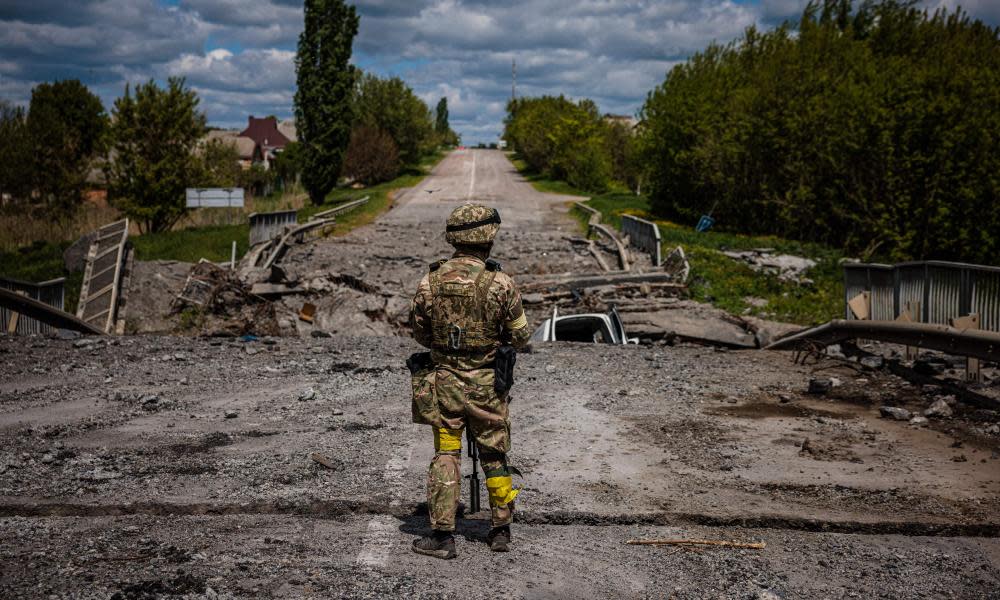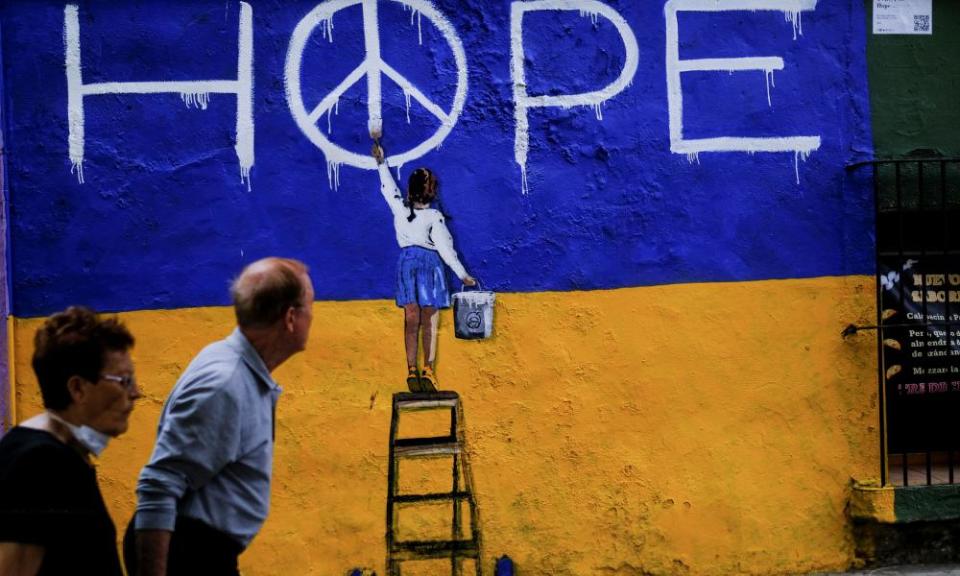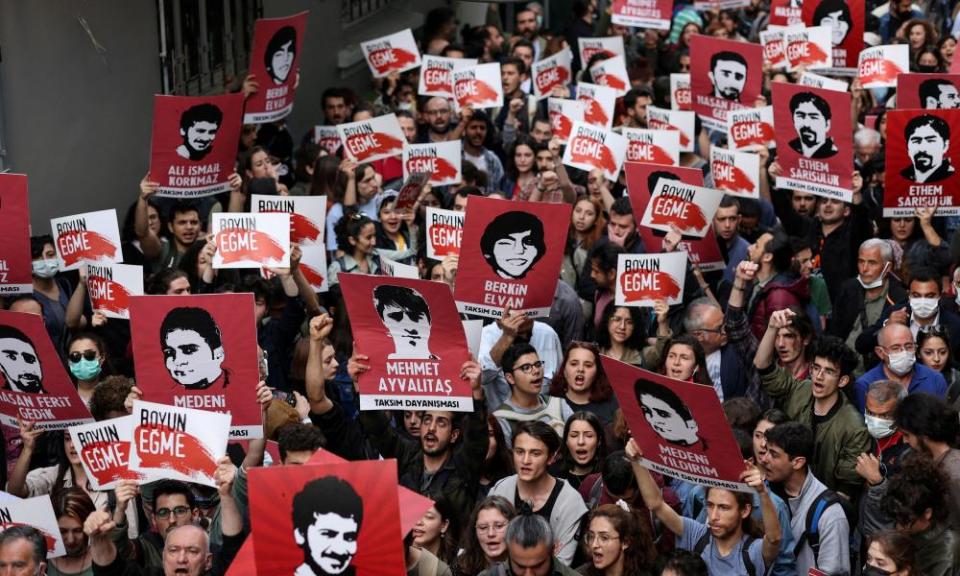Monday briefing: What would a ‘win’ look like for both sides in Ukraine?

Good morning. When the war in Ukraine first began, the fall of Kyiv, and the Ukrainian state more broadly, seemed highly likely. Almost three months on, the pendulum has swung in the opposite direction. Russia has suffered a series of significant military setbacks that make any victory for them look a much more distant and difficult prospect – but a swift win for Ukraine doesn’t look likely either.
As the war begins to enter a protracted phase, and with decisive developments on the ground becoming rarer and harder to read, I spoke to some experts about how the war in Ukraine might develop. First, though, the headlines – and a programming note: from today, we’ll be adding the Guardian’s crosswords to the First Edition mix. You’ll find links to them at the bottom of the email.
Five big stories
Ukraine | Ukraine’s primary negotiator in peace talks, Mykhailo Podolyak, has said that there will not be a ceasefire deal with Russia if it involves ceding any territory to Russia.
Health | More monkeypox cases are being detected in the UK on a daily basis, says a senior doctor. So far there have been 20 confirmed cases of the disease.
Cost of living |The chief executive of E.ON, Martin Lewis, has said that consumers in the UK should expect high fuel bills for at least another year and a half, with Lewis warning that costs could reach £3,000 a year after the price cap lifts in the autumn.
Ireland | Seven centuries’ worth of Irish archives, which were destroyed during the civil war in 1922, have been meticulously recreated by academics. At the end of June, there will be an immersive 3D reconstruction of the destroyed library and an extensive digital archive which will be open to the public.
Australia | Labor leader, Anthony Albanese, has been sworn in as the country’s 31st prime minister in Canberra.
In depth: Four ways the war could end

Since the start of the war in Ukraine, the discussion on how and when the conflict would end has been at the top of the agenda. Here are four scenarios for an end to the violence:
***
Ukraine wins
A Ukrainian victory means different things to different people. To some it is pushing Russia back to the territories it controlled before the start of the invasion; for others it’s about pushing it back to the pre-2014 borders, before Russia annexed Crimea.
Orysia Lutsevych, head of the Ukraine Forum and the Russia and Eurasia programme at Chatham House, told me that a real victory for Ukraine is one where the country is in a more secure position than it was before the war began. This is the second Russian-Ukrainian war in the last decade, she notes, and a meaningful victory should stop a third war from ever happening. Practically speaking, in the short term, Orysia says, “Ukraine will have to push Russia out of as much territory as possible, including the occupation in the south and in Donbas”.
But there is a larger issue. “A Ukrainian victory means that Putin’s doctrine and Russian revanchism is contained [in Russia] and, eventually, put an end to completely,” Orysia says. Anything else is an “interim solution” (which isn’t to be discounted if it could stop the immediate effects of war). But to claim any real long term resolution, she adds, the underlying problems that caused the war must be addressed and dealt with. And, perhaps most importantly, Orysia argues, the mistakes of 2015 cannot be repeated: “Ukraine was pushed into concessions and a ceasefire agreement that, in the end, only gave Putin an upper hand to prepare for a bigger war.”
***
Russia wins
A Russian victory is more difficult to imagine for a number of reasons. I spoke to senior international affairs correspondent Emma Graham-Harrison, who has been covering the war on the ground, about what it might look like. “First of all, it’s important to differentiate between whether the whole world is saying Russia won or if Putin decides to declare victory himself – because those are potentially two quite different things,” she says. Another reason why it’s so difficult to envision what victory for Russia might look like is that the goalposts have moved so dramatically since the start of the war. “Putin’s objectives were pretty clear: to take Kyiv and install a puppet government,” Emma says. “But now that seems militarily impossible.”
Another road to victory is to simply run down the clock, with Russia working under the assumption that, even if the west keeps supplying Ukraine with arms, Kyiv’s army might run out of military personnel. Or, as time wears on, the war may just fall down the agenda in western countries, and resources and capital may slowly stop flowing in. This could lead to a situation where Ukraine capitulates, but this would take years. A victory in this scenario would look like mass loss of life, much of Ukraine levelled, and economic devastation for both countries.
***
A negotiated settlement
One way the war could end, is the way that many wars in history have ended – some kind of peace deal. Dr Sam Greene, director of the Russia Institute at King’s College London, sees such a settlement as difficult to achieve. Russia’s initial demands from Ukraine were unworkable, he argues: “Demilitarisation is not likely to happen and ‘de-nazification’, whatever that means in the Ukrainian context, is a mythological problem, so it doesn’t really have anything other than a mythological solution.” These things cannot be negotiated, partly because they’re non-negotiables from the Ukrainian perspective, but also because some of the problems are entirely within the heads of the Russian government, Greene says.
The other sticking point is that Ukrainian president Volodymyr Zelenskiy is an elected representative of the Ukrainian people – any settlement has to be mandated by them too. “They would not support a negotiated solution that would cede control of Ukrainian territory on a permanent basis,” Greene adds.
So a negotiated settlement would have to mean that Russia would move away from some of its stated aims and Ukraine would have to move to some kind of neutrality status (this means that, under international law, Ukraine won’t interfere in armed conflict involving other belligerent parties – and crucially it cannot allow a belligerent party to use their country in any kind of militaristic capacity).
The most important question in all of this, Greene says, is what the west’s response will be because their priority is keeping Russia isolated at least to some degree to stop them from waging further war. “The more you keep Russia isolated the harder it is for them to reinvest in their military,” he says. “So sanctions actually do become a tool of military engagement.” But in the context of a settlement, the international community would need to prioritise peace, not maximum humiliation for Russia.
***
A ceasefire
The most likely end to the violence will not be an end to the war at all, but a ceasefire, says Greene. “Zelenskiy has been clear about his willingness to talk to the Russians, if the Russians are willing to talk openly and honestly about some kind of a ceasefire arrangement that will stop people from dying.” It’s the quickest and most effective way to curb the continued violence without anyone having to admit defeat, and a process the Ukrainian president restated his willingness to embark upon over the weekend.
While the relief of a ceasefire would be welcome, it could have unwelcome consequences, too. As in the years after the initial invasion of Ukraine, a prolonged stalemate could just give space and capacity for Russia to re-strategise and reinvest in its military – which could ultimately lead to an even lengthier war.
What else we’ve been reading
The world of the super-rich has always seemed elusive but that has only further propelled our curiosity and suspicion. In this fascinating piece, Andrew Anthony takes a long walk around London with sociologist Caroline Knowles to document and examines the ways in which extreme wealth has turned London into a playground for the elite. Nimo
Kids ask the most searching questions about the meaning of life! Philosopher Scott Hershovitz does a fine job of helping with queries like “Why are there numbers”, and definitely, 100% did not clarify what the ontological argument is for this fairly hazy 38-year-old. Archie
Not many journalists know as much about the human cost of fast fashion as Annie Kelly, or explain it so well. She reports for the Observer on the fallout from the murder of a woman who worked in a factory making clothes for H&M. Archie
Richard Osman’s first novel sold 45,000 copies in three days. Marian Keyes has sold more than 35m in a 30 year career. Despite this disgusting success, they’re also... really nice? Lisa Allardice’s interview is a correspondingly lovely read. Archie
Political journalist Martha Gill looks at the public reaction to the Johnny Depp-Amber Heard defamation trial and what it shows about where we are with the MeToo movement five years after it started. Nimo
Sport
Football | Tottenham secured the fourth Champions League place with a comfortable 5-0 victory over Norwich City.
Football | Manchester City came from 2-0 behind against Aston Villa to pip Liverpool to the Premier League title in an extraordinary afternoon of football, in which Leeds United saved themselves from relegation – condemning Burnley to a return to the Championship.
F1 | After lagging behind for the first 30 laps, Max Verstappen won the Spanish Grand Prix in a surprising turn of events.
The front pages
The warning about rising energy bills from Michael Lewis, the boss of E.ON, is the lead in several papers this morning. The headline on the Times splash is “Fuel poverty predicted to hit 40% of households” whereas the Mirror says: “Energy boss: prices are too high”. The Express splash headline takes a figure from Lewis’s warning and leads with “Time for rescue Plan, Rishi! Energy bills to hit £3,000”, while the Daily Record also focuses on that big increase in costs: “Energy bills to hit £3000 a year”. The i has “Cost of living help on hold as PM focuses on Partygate”.
The Guardian reports that Boris Johnson is going to say that work is the best way to cope with rising energy bills, but its main story is another alarming statistic: “Children’s mental health in crisis as cases rocket to a record high”. The Mail leads with “PM allies accuse Sue Gray of ‘playing politics’” but the Telegraph looks further afield for its lead: “Gene-edited crops to help ease Ukraine food crisis”. The FT has “Investors challenged by demise of three-decade era of globalisation” and the Scotsman’s main story is “Minister urges workers to be ‘sensible’ over pay”.
Today in Focus

A travesty in Turkey: the Gezi Park trials
Eight human rights activists have been given long prison sentences for anti-government protests in Turkey. Sami Kent reports.
Cartoon of the day | Brian Adcock
The Upside
A bit of good news to remind you that the world’s not all bad
31 years ago, Sue and Chris Anayiotou took over the Hope Workers Cafe, an archetypal greasy spoon and beloved north London institution. Even as similar cafes close in thousands under challenge from overpriced hipster chains, the Hope is still there, serving a tribe of loyal customers and giving a free hot meal to anyone who needs one. Jay Rayner spent a day there (eating a No 5 cooked breakfast and a moussaka) and hears why – even as Sue and Chris consider retirement, leaving the cafe’s future up for grabs – the place means so much. “I love my customers,” Sue says. “They’re like my family.”
Sign up here for a weekly roundup of The Upside, sent to you every Sunday
Bored at work?
And if all that isn’t enough to keep you occupied, I’ll leave you with links to the Guardian’s crosswords to keep you entertained throughout the day – with plenty more on the Guardian’s Puzzles app for iOS and Android. See you tomorrow.

 Yahoo Movies
Yahoo Movies 